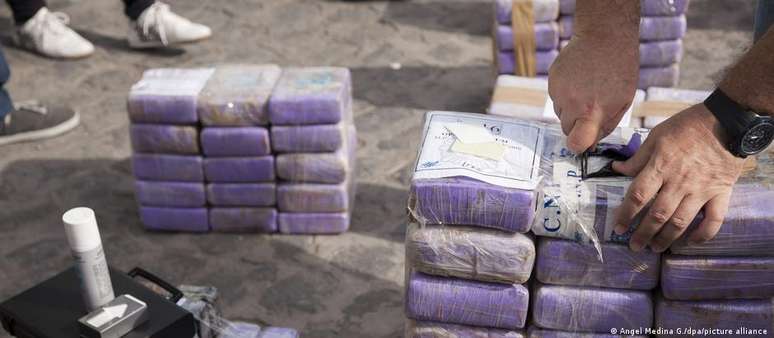German Interior Minister visits Brazil, Colombia, Peru and Ecuador to strengthen cooperation against organized crime. There is an increase in violence linked to illegal drug trafficking in Europe: this week, German Interior Minister Nancy Faster will visit South America in an attempt to strengthen cooperation in the fight against organized crime. In recent years, transatlantic traffic has intensified at numerous ports, a phenomenon notable for the increase in seizure volumes on both sides of the ocean. And with drugs, violence also advances on both continents.
In 2023, the largest cocaine seizure that year on the European continent took place in Hamburg, with an estimated market value of $3.5 billion. Other European countries that traditionally have a lower presence of organized crime, such as the Netherlands and Belgium, have also seen an increase in criminal actions, especially in port cities such as Rotterdam and Antwerp. In the Belgian port alone, 116 tonnes of cocaine were seized in 2023, a record quantity, but which corresponds to a small fraction of the volume actually shipped.
On the other side of the Atlantic, a change in scale has occurred with a boom in the quantity of drugs passing through Brazilian ports and reaching the European continent, measured by the volume of seizures, says sociologist Isabela Vianna Pinho, PhD student at the Federal University of São Carlos (UFSCar), which studies illegal markets and ports.
In addition to Santos, Latin America’s largest port, other Brazilian port areas such as Paranaguá have seen a sharp increase in drug shipments. In the region, in addition to traditional emission zones such as Colombian cities, Guayaquil, Ecuador, has become known in recent years for the strong presence of criminal organizations that use its maritime routes to ship drugs. In Argentina, the port municipality of Rosário experienced a similar phenomenon.
“The huge flow of goods in these ports makes inspection difficult and encourages the use of these routes by criminals. It is strategic for traffickers to use these existing facilities,” explains Vianna Pinho. The researcher recalls the volume of thousands of containers that pass through these ports daily, which makes verification work difficult.
Increased violence and risks of narco-states
In January, Amsterdam Mayor Femke Halsema warned of the risk of the Netherlands becoming a narco-state in an article published in the British newspaper The Guardian. “Spurred by globalization and international criminalisation, the illegal drug trade has become more profitable, professional and ruthlessly violent. The effects have been disastrous. Over the past decade, the port of Rotterdam, the largest in Europe, has become a global transit hub for cocaine,” he wrote.
According to Vianna Pinho, the increased sense of insecurity is linked to the expansion of cocaine circulation at a transnational level. “Historically, violence was concentrated in drug-producing countries. Recently there has been an expansion and conflicts are also affecting European countries,” she says.
In recent years, disputes between criminal groups have led to shootings and executions on public streets in traditionally peaceful European cities. In its annual report on the cocaine market for 2023, the United Nations Office on Drugs and Crime (UNODC) highlighted that “the use or threat of violence by criminal networks is a growing concern in Europe ”. In recent years there has been an increase in serious incidents of violence linked to organized crime, especially in drug markets, in some European Union countries and neighboring regions, highlights the document
“The risks faced by European countries are well known in Latin America. To contain them, more and more global cooperation measures are needed, since it is not a local problem”, assesses Vianna Pinho.
Increase in areas of activity
In recent years, groups involved in drug trafficking in Latin America have begun to expand their areas of activity, in a phenomenon similar to European mafias. Additionally, they began operating in a number of countries, replicating traditional multinational corporation models.
“The drug market is transforming. Drug trafficking groups are bringing out other sources of resources, such as illegal gold mining,” says Daniel Bonilla Calle, professor of international affairs at the CEIPA University Foundation in Bogotá. The advancement of criminals into these other business sectors is seen as an important element in a number of environmental problems, such as deforestation in the Amazon.
Extortion is another important source of financing for criminal organizations in the region and the expansion of areas of activity also involves avocado cultivation, in the case of Mexico. “We could say that today 60% of resources continue to come from drugs, while 40% come from other revenues”, estimates Bonilla Calle.
“One of the characteristics of these organizations is transnationality, which has been facilitated recently by technology, just as in the case of traditional companies,” says Bonilla Calle. “It is not possible to attack organized crime without very well-structured collaboration networks between the authorities of different countries,” she estimates.
Greater cooperation
In Brasilia, after a meeting with the director general of the Federal Police, Andrei Rodrigues, the German minister declared that cooperation between the countries is already working well. “We want to go even deeper,” he added. Also in the region, Faeser will travel to Colombia and Peru, the two largest cocaine producers in the world, and Ecuador, which is facing a serious security crisis due to drug trafficking.
“I see with great concern the massive importation of cocaine from Latin America. This drug destroys people and brings enormous profits to organized crime,” said Faeser.
The minister said she wanted to help “repel the destructive influence of drug cartels in their countries of origin”, referring to environmental destruction, violence and corruption. “Criminal groups are spiraling into incredible violence, including in Central Europe.”
In addition to Faeser, Hamburg Mayor Peter Tschentscher also recently traveled to Colombia and Ecuador together with his counterparts from Rotterdam and Antwerp to discuss common strategies in the fight against drug trafficking with local security authorities.
“Cooperation is important, but we know that traditional state measures often end up generating more violence. We don’t see many alternative measures other than the prohibitionist attitude”, evaluates Vianna Pinho. In her opinion, the traditional approach to fighting crime centered on kidnappings has not produced effective results.
For the researcher, greater market regulation may represent a more effective alternative to current approaches, in addition to the need to increase cooperation for intelligence actions. In his article in the Guardian, the mayor of Amsterdam cited market regulation, state monopolies or supplies for medical purposes as some of the possible alternatives to address the issue.
Source: Terra
Rose James is a Gossipify movie and series reviewer known for her in-depth analysis and unique perspective on the latest releases. With a background in film studies, she provides engaging and informative reviews, and keeps readers up to date with industry trends and emerging talents.








